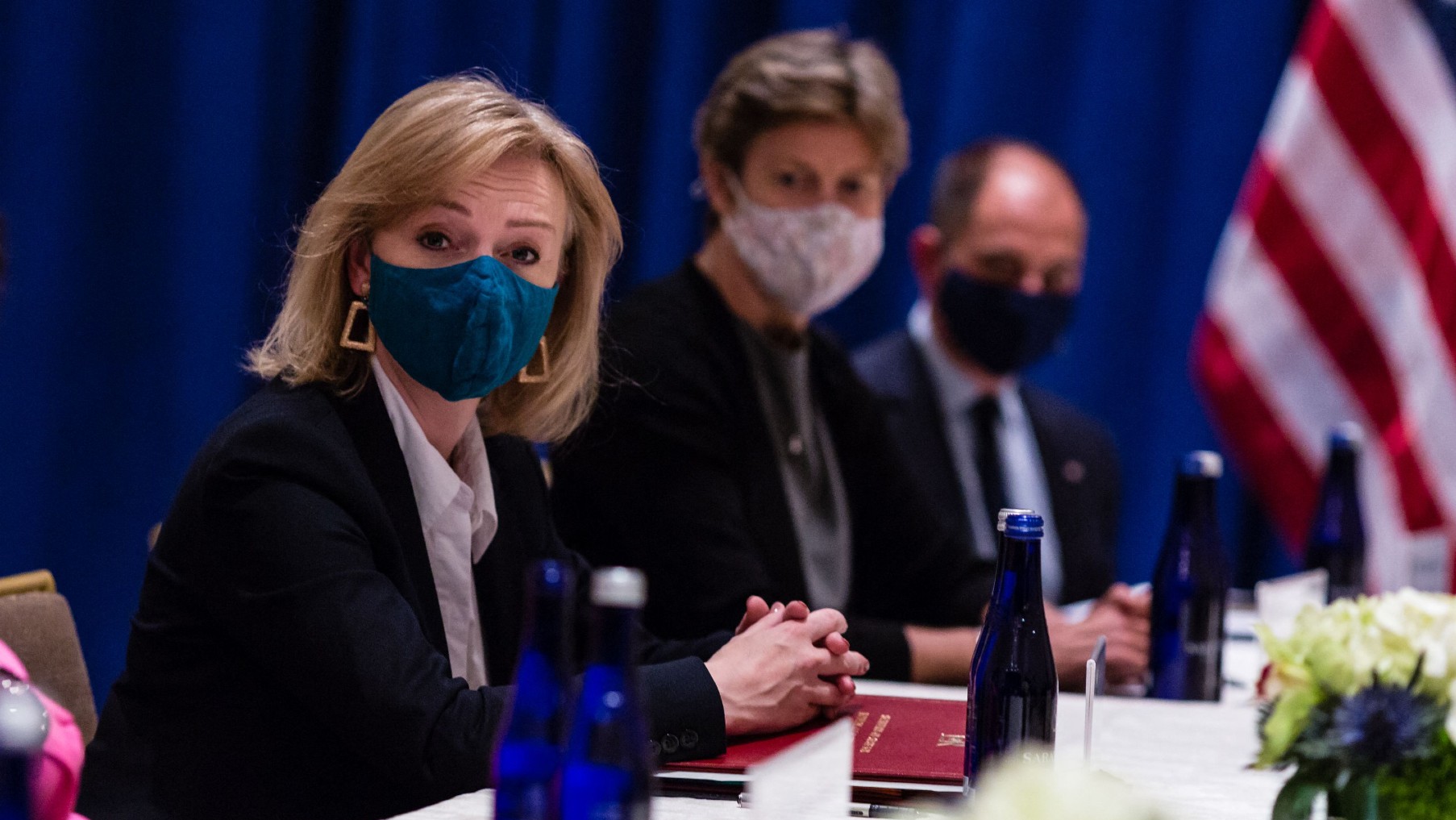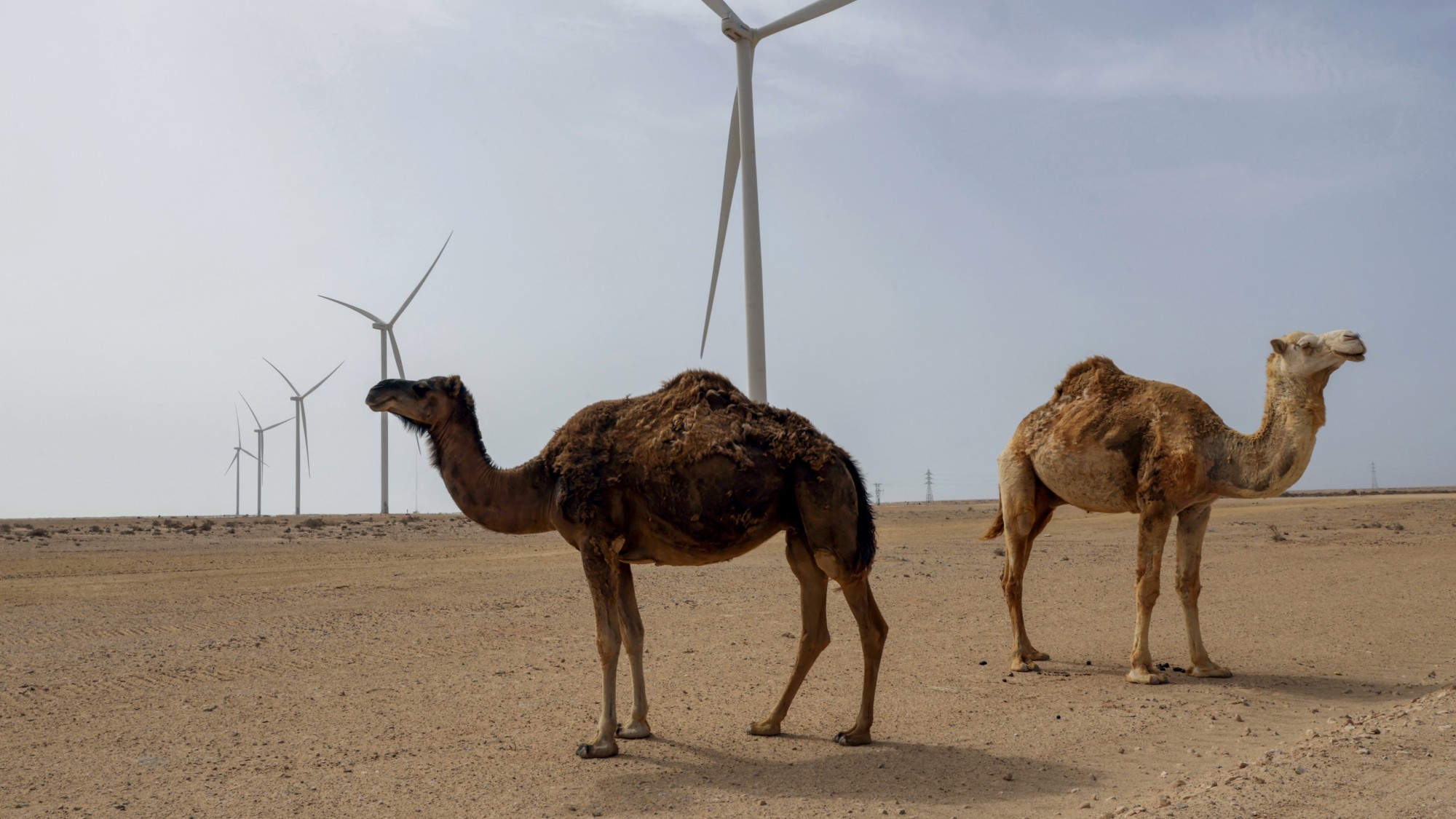Liz Truss’s five biggest challenges as foreign secretary
France accuses UK of ‘opportunism’ as row over Aukus security pact grows

A free daily email with the biggest news stories of the day – and the best features from TheWeek.com
You are now subscribed
Your newsletter sign-up was successful
Liz Truss faces a bumpy start to her tenure as foreign secretary as she comes face-to-face with her French counterpart amid mounting anger in Paris over the cancellation of a major nuclear submarine contract.
The newly appointed minister is heading for a “furious diplomatic confrontation” with France’s Jean-Yves Le Drian today as the five permanent members of the United Nations Security Council - UK, US, France, China and Russia - meet in New York at the UN General Assembly, said The Guardian.
Le Drian has described the new Aukus security pact between the UK, US and Australia as a “stab in the back” for France, after a £48bn submarine contract was cancelled as a result of the agreement.
The Week
Escape your echo chamber. Get the facts behind the news, plus analysis from multiple perspectives.

Sign up for The Week's Free Newsletters
From our morning news briefing to a weekly Good News Newsletter, get the best of The Week delivered directly to your inbox.
From our morning news briefing to a weekly Good News Newsletter, get the best of The Week delivered directly to your inbox.
Diplomatic fall-out with France
Under the Aukus pact, the US will share secret nuclear technology to help Australia build nuclear submarines as part of a push to counter China’s influence in the South China Sea. However, a 2016 deal for France's Naval Group to build a fleet of conventional submarines has been cancelled as a result.
Foreign Affairs Minister Le Drian has accused Australia and the US of lying over the deal and has warned of a "serious crisis between us".
After President Emmanuel Macron recalled ambassadors from both Washington and Canberra over the weekend, Le Drian told national TV channel France 2 that the move was unprecedented “in the history of relations between the United States and France” and was a “serious political act” that “shows the magnitude of the crisis that exists now between our countries”.
A free daily email with the biggest news stories of the day – and the best features from TheWeek.com
Meanwhile, France’s Minister for European Affairs Clement Beaun accused the UK of entering into the partnership “opportunistically” as a way to prove its place in the world post-Brexit, according to The Telegraph. But London was a “junior partner” in the arrangement, he added.
Echoing those claims, Le Drian said that France had seen “no need” to recall its ambassador to the UK, which was guilty of “constant opportunism”.
“Britain in this whole thing is a bit like the third wheel,” he said.
As the row intensifies, the BBC’s diplomatic editor James Landale warned that if the West wants to successfully protect its interests in the Indo-Pacific, France and Europe “need to be on the same page as the US and its Anglophone allies”.
But “right now both sides are not even reading the same book”, he wrote.
And the potential crisis is not the only challenge facing Truss in her new role in one of the great offices of state.
Release of British-Iranian dual nationals
Truss announced on Sunday that she would be speaking to Iran’s Foreign Minister Hossein Amir-Abdollahian at the UN talks and would demand the release of dual-nationals including charity worker Nazanin Zaghari-Ratcliffe, who has been detained in Tehran for more than five years.
The new foreign secretary said she would also raise the issue of Iran’s nuclear programme. In a statement, she said: “I will be asking Iran to ensure the immediate and permanent release of all arbitrarily detained British nationals in Iran, and to begin working with us to mend our fractured relations.
“The UK, US and our international partners are fully committed to a nuclear deal, but every day that Iran continues to delay talks whilst escalating its own nuclear programme means there is less space for diplomacy.”
Zaghari-Ratcliffe’s husband, Richard, told Sky News that he had a ten-minute phone call with Truss before she left for New York on Sunday. But he said that he was “not very confident” of a breakthrough in his wife’s case, which “may have a while to run still”.
Rekindling US-UK ‘special relationship’
High on Truss's agenda will be “rekindling our relationship with the US”, a senior Tory told The Guardian. As the paper noted, Britain “felt left in the dark” after the US withdrew troops from Afghanistan despite protestations from - but little consultation with - London.
Truss's predecessor, Dominic Raab, landed in hot water for being on holiday in Crete when the Taliban entered Afghanistan’s capital, Kabul.
The fallout over Raab's handling of the swift ending to the 20-year war saw him shunted into the Justice Department during Boris Johnson's cabinet reshuffle last week - “though he was given the consolation prize of deputy prime minister”, said the paper.
If Truss wants to fare better in her new role, she should see the withdrawal from Afghanistan as a “wake-up call to identify what the UK wants from the US and what the country is willing to give in return”, argued Jamie Gaskarth, a professor of foreign policy at The Open University, in an article on The Conversation.
“The UK wants a deep bilateral defence relationship, US investment in European security, the reduction of trade barriers and help with coordinating a global response to climate change,” he wrote. “Any UK concession or extra commitment should be leveraged to enhance one or more of these priorities.”
Promoting Global Britain
In an article published in The Telegraph on Saturday, Truss wrote that her visit to the UN headquarters in New York City this week marked “the start of an autumn where Global Britain plants its flag on the world stage”.
She pointed to events such as the upcoming UN Climate Change Conference (COP26) in Glasgow as evidence of “Global Britain in action”, with the UK ready to “tackle the major challenges of our age alongside our friends and allies.”
“I want us to project this vision to the world and ensure that everyone in Britain knows that our best days lie ahead,” she continued.
The pro-Conservative newspaper's columnist Matthew Lynn threw his support behind Truss, who “proved herself one of the most capable ministers in the Johnson administration” in her previous role as trade secretary, he wrote.
In fact, “we should let her keep her old job, as well as taking on her new one”, Lynn suggested. He is calling for her former department to be merged with the Foreign Office “to create a super-ministry charged both with boosting Britain’s exports and, even more importantly, championing free and open markets in a world where that cause has few supporters left”.
Salvaging EU relations
The trickiest challenges that lie ahead for Truss also include navigating European relations in the post-Brexit period.
As a former Remainer, she could be seen as “backsliding” if she opens up a route for the UK to return to EU decision-making forums, wrote Gaskarth on The Conversation.
“As such, it will require strong leadership and a willingness to risk some domestic unpopularity to enhance Britain’s global influence,” he warned.
-
 Are Hollywood ‘showmances’ losing their shine?
Are Hollywood ‘showmances’ losing their shine?In The Spotlight Teasing real-life romance between movie leads is an old Tinseltown publicity trick but modern audiences may have had enough
-
 A dreamy long weekend on the Amalfi Coast
A dreamy long weekend on the Amalfi CoastThe Week Recommends History, pasta, scenic views – this sun-drenched stretch of Italy’s southern coast has it all
-
 Can foster care overhaul stop ‘exodus’ of carers?
Can foster care overhaul stop ‘exodus’ of carers?Today’s Big Question Government announces plans to modernise ‘broken’ system and recruit more carers, but fostering remains unevenly paid and highly stressful
-
 How corrupt is the UK?
How corrupt is the UK?The Explainer Decline in standards ‘risks becoming a defining feature of our political culture’ as Britain falls to lowest ever score on global index
-
 The high street: Britain’s next political battleground?
The high street: Britain’s next political battleground?In the Spotlight Mass closure of shops and influx of organised crime are fuelling voter anger, and offer an opening for Reform UK
-
 Is a Reform-Tory pact becoming more likely?
Is a Reform-Tory pact becoming more likely?Today’s Big Question Nigel Farage’s party is ahead in the polls but still falls well short of a Commons majority, while Conservatives are still losing MPs to Reform
-
 Taking the low road: why the SNP is still standing strong
Taking the low road: why the SNP is still standing strongTalking Point Party is on track for a fifth consecutive victory in May’s Holyrood election, despite controversies and plummeting support
-
 What difference will the 'historic' UK-Germany treaty make?
What difference will the 'historic' UK-Germany treaty make?Today's Big Question Europe's two biggest economies sign first treaty since WWII, underscoring 'triangle alliance' with France amid growing Russian threat and US distance
-
 Is the G7 still relevant?
Is the G7 still relevant?Talking Point Donald Trump's early departure cast a shadow over this week's meeting of the world's major democracies
-
 The 50-year battle for Western Sahara
The 50-year battle for Western SaharaThe Explainer UK is latest country to back Moroccan plan to end decades-long dispute with Algerian-backed Polisario Front
-
 Angela Rayner: Labour's next leader?
Angela Rayner: Labour's next leader?Today's Big Question A leaked memo has sparked speculation that the deputy PM is positioning herself as the left-of-centre alternative to Keir Starmer